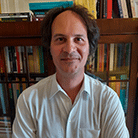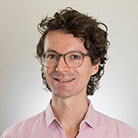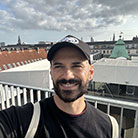HUM:Global Flagship Initiatives
Each year HUM:Global launches a number of Flagship Initiatives grounded in the research interests and aims of the HUM:Global researchers (PPG and Secretariat).
The purpose of the Flagship Initiative funding is to facilitate and financially support the development of large-scale applications for projects, networks and/or centers, that HUM:Global researchers (PPG and Secretariat) are a part of.
In 2024, we launched four projects by Fanar Haddad, Haakon Ikonomou, Jun Liu, and Georg Walter Wink. In 2025, three additional projects are being launched by Fabio Santos and Marie Sandberg, Petar Mitric, and Gunvor Simonsen and Falicia Fricke.
Each of these seven projects is outlined below.
Alternative platforms, alternative politics
Jun Liu, associate professor, Center for Tracking and Society
Department of Communications
 This Flagship Initiative aims to advance our understanding of global digital platforms beyond those dominant, familiar ones to explore and interrogate a wider range of alternative platforms and their facilitation of our social, cultural, political, and economic interactions and exchanges. It asks questions about alternative platforms that we typically ask of major corporate platforms: Which kinds of alternative platforms are being employed by which groups of users, and for what purposes? What socio-political and economic contexts drive the adoption of these platforms? Or, under which circumstances are specific actors drawn to the affordances and functionalities of less well-known alternative platforms? What new (alternative) forms of engagement, influence, and politics emerge on these alternative platforms?
This Flagship Initiative aims to advance our understanding of global digital platforms beyond those dominant, familiar ones to explore and interrogate a wider range of alternative platforms and their facilitation of our social, cultural, political, and economic interactions and exchanges. It asks questions about alternative platforms that we typically ask of major corporate platforms: Which kinds of alternative platforms are being employed by which groups of users, and for what purposes? What socio-political and economic contexts drive the adoption of these platforms? Or, under which circumstances are specific actors drawn to the affordances and functionalities of less well-known alternative platforms? What new (alternative) forms of engagement, influence, and politics emerge on these alternative platforms?
The initiative will further four key issues as follows. First, by identifying and acknowledging alternative platforms, we seek to understand diverse, localized, and contextualized adoption of communication technologies in a rapidly evolving digital landscape. Second, this initiative not only engages with several global themes, opportunities, and challenges but also anticipates emerging issues related to digital platforms. Our research takes a critical perspective on the power of big tech. Additionally, our initiative will consider the implications of these platforms for global inequality and access. Third, cross-departmental collaboration brings together a wealth of knowledge and expertise, including insights into the social and spatial mobilities of people, media use and appropriation, and the political economy of culture. This interdisciplinary approach equips our team to unpack the complexities and under-studied issues surrounding alternative media and politics. Fourth, collaborating with organizations and practitioners outside the academic sphere will provide us with practical insights and real-world applications.
The initiative consists of three types of activities (a) we will map out alternative platforms globally and build a database of academic literature on these platforms. (b) we will organize two to three talks involving the group members across departments, as well as partnerships with organizations beyond academia like International Media Support (IMS). These events will investigate the key questions addressed in the initiative and will cover a range of country cases, including those from the Global South and other understudied contexts. (c) Third, we will refine and further develop this proposal to seek larger funding opportunities.
Team members: Elena Meyer-Clement, Associate Professor, Department of Cross-Cultural and Regional Studies (ToRS) Lotte Pelckmans, Associate Professor, Centre for Advanced Migration Studies (AMIS)
Activities
- Planning a pre-conference in 2027 on alternative media/platform and digital activism with University of Glasgow
- Horizon European Application (submitted 2025 and under review): Hybrid Media strategies for Overcoming Polarisation and Extremism (HOPE)
- Alternative Platforms, Alternative Politics, seminar, 27 May 2025
- The Persistence of Resistance: Rekindling agency and reimagining alternative media in the algorithmic age, talk, 20 May 2025
Caribbean Fugitives: A Regional Data Infrastructure
Gunvor Simonsen, associate professor, and Felicia Fricke, postdoctoral fellow
The Saxo Institute


This Flagship Initiative will create the foundation for an international consortium of researchers that will establish a Caribbean-wide data infrastructure concerning enslaved fugitives. Starting with runaway advertisements and jail lists in the region’s newspapers, the platform we aim to develop has the potential to also include, at a later date, evidence from manuscript sources scattered in the archives of the six imperial powers present in the Caribbean from early European colonisation until the abolition of slavery in Cuba in 1886. We will gather key stakeholders from the Caribbean and beyond, map the key challenges they have experienced in researching and making open access data regarding fugitives in the Caribbean, identify ways to overcome these, and establish a framework for further collaboration.
Currently, Caribbean newspapers published during the colonial era are being researched intensively for the insights they provide into the practices of fugitivity in the Caribbean. A diverse set of scholars from disciplines such as history, anthropology, cultural geography, and cultural studies are interested in fugitive advertisements and jail lists and collect them independently. The result is the emergence of scattered datasets, of uneven quality and coverage, often hosted by individual university data labs or departments and sometimes inaccessible to other researchers and to the public. Furthermore, despite the usefulness of these sources for answering many different research questions, the datasets are often structured to the needs of individual scholars or clusters of scholars. The scattered nature of the datasets and their often narrow focus make it difficult for other scholars and the broader public in the Caribbean to use them for their own engagement with the region’s past. It is in this context that we aim to create a consortium of scholars who will collaborate to establish a coherent dataset, published online by a research institution of or in the Caribbean, most likely the Digital Library of the Caribbean. The Flagship Initiative will be a first step in that direction.
CHIOS - Centre for history, international order & strategy
Haakon A. Ikonomou, associate professor in Global History
The Saxo Institute
 This Flagship Initiative aims to create a Centre for History, Strategy, and International Order (CHIOS) based jointly at the University of Copenhagen, Faculty of Humanities and at the Helmut-Schmidt-University, Hamburg. CHIOS would be focused on Northern Europe and the Baltic Sea Region as a geopolitical space in rapid transition - particularly after Russia’s full-scale invasion of Ukraine - understood in a European, Atlantic and Global context. A historical and humanities-based understanding of how our current international (dis)order emerged, which systems and ideas of order have been prevalent and germane over the last centuries; and which technologies and infrastructures of ordering – instruments and languages of governance – that have been built and reformed across historical ruptures is needed.
This Flagship Initiative aims to create a Centre for History, Strategy, and International Order (CHIOS) based jointly at the University of Copenhagen, Faculty of Humanities and at the Helmut-Schmidt-University, Hamburg. CHIOS would be focused on Northern Europe and the Baltic Sea Region as a geopolitical space in rapid transition - particularly after Russia’s full-scale invasion of Ukraine - understood in a European, Atlantic and Global context. A historical and humanities-based understanding of how our current international (dis)order emerged, which systems and ideas of order have been prevalent and germane over the last centuries; and which technologies and infrastructures of ordering – instruments and languages of governance – that have been built and reformed across historical ruptures is needed.
Concretely, we propose a centre built up around three thematic pillars: (I) International Orders: between regional and global; (II) Strategic Conceptualizations of Order; (III) Technologies and Infrastructures of Ordering. Cutting across these thematic pillars, we are interested in historically informed knowledge production and a strategic policy interphase on (a) innovations, (b) implementations and (c) the resilience of international orders in the 19th, 20th and 21st centuries. Accordingly, the centre is not only interested in how our currently embattled international (dis)order and our Northern European region withstand pressures, defend values, or safeguard interests, but equally in processes of renewal, realignment, and commitment to new international orders in the making – historically and today.
Partnership: HUM:Global, CEMES, 4EU+ at the University of Copenhagen & the Helmut Schmidt University.
Activities
- The State of Multilateralism Roundtable: Multilateralism: A global view, roundtable discussion organized by META UN in collaboration with CHIOS, HUM:Global and UN Library and Archives, 27 January 2026
- Spatial Imaginations of Europe, 1870s-2020s: Ideas, Politics, Economics and Law, conference organized by CEMES, INNER_LEAGUE and CHIOS at UCPH, 8-9 December 2025
- Northern Europe in the International System: War, Peace and Security, 1814/15-1914, CHIOS workshop at HSU, 2-3 June 2025
- LEARNING FROM CATASTROPHE. The Second World War and the New World Order of the Long 20th Century, lecture, 8 May 2025
- The Nuclear Challenge: History, Present and Future of Nuclear Deterrence international seminar, 5-6 May 2025
- Inaugural CHIOS-Körber Stiftung Roundtable, roundtable discussion, 8 April 2025
- Renewing Transatlantic Strategy: Lessons from History for a Sustainable World Order, webinar, 17 February 2025
- Atlanticism in a changing world, public roundtable, 10 December 2024
Far right thought in a global perspective: traditionalist reactions to Western liberal modernity
Georg Walter Wink, associate professor, Centre for the Study of Nationalism
Department of English, German and Romance Studies
 This Flagship Initiative is based at UCPH’s Centre for the Study of Nationalism. The objective is to strengthen the investigation of far-right ideologies by exploring their still less known traditionalist and religious-spiritual dimensions.
This Flagship Initiative is based at UCPH’s Centre for the Study of Nationalism. The objective is to strengthen the investigation of far-right ideologies by exploring their still less known traditionalist and religious-spiritual dimensions.
Previous research has shown that these tend to oppose “degenerated” Western progress and modernity but not how these tendencies manifest themselves beyond the European and US contexts and in relation to Anti-Western decoloniality. In a new approach and building on the area and language expertise of the Centre’s researchers as well as international collaborators, the project focuses on regions such as Latin America, Turkey, the Middle East and South/Southeast Asia. Research will scrutinize the far right’s antimodernist canon to find out how in each context these texts are received, appropriated, reinterpreted, transformed and how they draw on religious and other traditions. Based on this, researchers will analyze the metapolitical strategies and techniques (including the use of social media) through which these ideologies are promoted as well as examine the transfer of ideas through intellectual networks of far-right ideologues in and between these regions.
During the academic year 2025/2026, the project will consolidate and expand the research group with support of an advisory board. Through invited expert talks, seminars and internal workshops this new network will create awareness for the topic of “globalized Anti-Modernism”, explore and delimit this broad field, elaborate a research plan and identify funding opportunities.
Activities
- DFF1 and DFF2 application-writing in progress
- DFF Explorative Network funding awarded (788,636 DKK): Lifeworlds of the New Right: Identities, Imaginaries and Idioms of the Global New Right in Everyday Contexts
- 4EU+, Seed Money Application (submitted 2025): New Right Cultural Milieus in Europe” (NR-CULT) 46,722 EUR. Collaboration with University of Warsaw, Department of the History of Social Thought, University of Milan, Department of Historical Studies and Department of Social and Political Sciences
- Far right thought in a global perspective: tradionalist reactions to Western liberal modernity, kick-off seminar, 19 March 2025
Global Migrations: Histories, Everyday Lives, and Epistemologies
Fabio Santos, assistant professor, and Marie Sandberg, associate professor
The Saxo Institute


This Flagship Initiative will establish a research network that critically investigates global migration across temporal, spatial, and epistemic registers. The focus of the collaboration will be three-fold: 1) the histories of global migrations and their entanglements with empire, labor, and nation-building, 2) the everyday lived experiences of migrants and how they have circumvented borders, negotiated constraints, and forged new forms of belonging, and 3) the epistemologies through which migration is studied, represented, governed – as well as the forms of knowledge produced by migrants themselves.
We propose to host an international workshop at the Saxo Institute, University of Copenhagen, in Spring 2026 that will bring together scholars from different disciplines and with complementary regional expertise. The goal is to facilitate exchanges across area expertise, methods, and positionalities to identify shared research priorities and develop a roadmap toward larger collaborative funding proposals – most concretely to the next joint call by CHANSE (Collaboration of Humanities and Social Sciences in Europe) and HERA (Humanities in the European Research Area).
While migration is a key theme in global humanities, research on it often remains segmented by discipline, by methodological approach, or by geographical scope. This initiative starts from the recognition that migration is not only a demographic phenomenon but also a historically embedded and epistemically contested field, shaped by colonial histories and legacies, global inequalities, and shifting moral economies. Through this Flagship Initiative, we plan to develop an interdisciplinary dialogue on how to historicize and theorize migration beyond methodological nationalism, present-centric thinking and disciplinary silos, create a research network that centers migrant knowledge, overlooked histories of migration, and everyday convivialities as counterpoints to dominant framings of crisis and integration, and critically reflect on the production and circulation of knowledge about migration: who speaks, who is silenced, and how academic work can engage ethically with migrants’ experiences globally.
Minding the Gap: Generational Dynamics in the Global Audiovisual Industry
Petar Mitric, assistant professor in Film Studies
Department of Communications
 This Flagship Initiative will prepare a research project on the generational dynamics in the global audiovisual industry focus on age-related inequalities in access to leadership, knowledge transfer, and institutional renewal – as well as their broader social repercussions. While diversity and inclusion have become central themes in cultural industry research, age remains an often-overlooked category in both academic inquiry and policy development. This project aims to address that critical gap. The Flagship phase has one core objective: to prepare a detailed application for external research funding.
This Flagship Initiative will prepare a research project on the generational dynamics in the global audiovisual industry focus on age-related inequalities in access to leadership, knowledge transfer, and institutional renewal – as well as their broader social repercussions. While diversity and inclusion have become central themes in cultural industry research, age remains an often-overlooked category in both academic inquiry and policy development. This project aims to address that critical gap. The Flagship phase has one core objective: to prepare a detailed application for external research funding.
Through the Flagship Initiative funding from HUM:Global, we will organize series of two workshops at the University of Copenhagen during spring 2026. The purpose of these meetings is to initiate a structured collaboration between seven partner institutions (University of Copenhagen, University of Toronto, Lusofona University, Dublin City University, Sapienza University of Rome and Babes-Bolyai University) with the aim of preparing a large joint research application for submission in 2026/early 2027. These meetings will allow us to 1) align our theoretical frameworks and methodological preferences, 2) identify relevant research questions and case studies, 3) develop a shared work package structure and timeline, 4) assign clear responsibilities among the partner institutions, 5)discuss practical issues such as ethical protocols, data management, and staffing, and 6)begin drafting sections of the funding application, including budget and policy relevance.
Shia Homelands: nationalism, transnationalism and diasporic trans localism
Fanar Haddad, assistant professor in Arab Studies
Department of Cross-Cultural and Regional Studies
 The project looks at the various ways in which Shia identity and forms of Shia belonging are imagined. In doing so, the project challenges the assumed binary between the national and the transnational. Though politically framed as mutually exclusive, the two categories are often mutually informing and reinforcing. As such, if Shia identity is imagined along a spectrum running from nationally embedded to globally-defined framings of Shiism, our approach considers not just the contradictions but the ambiguities and even the simultaneity between these various registers as well. The project will have six themes or work packages: 1. Shia identity and nationalism; 2. Diasporic Shiism; 3. Translocalism; 4. Shia material culture and imagined spaces of Shia; 5. Islamist actors; 6. Charity networks
The project looks at the various ways in which Shia identity and forms of Shia belonging are imagined. In doing so, the project challenges the assumed binary between the national and the transnational. Though politically framed as mutually exclusive, the two categories are often mutually informing and reinforcing. As such, if Shia identity is imagined along a spectrum running from nationally embedded to globally-defined framings of Shiism, our approach considers not just the contradictions but the ambiguities and even the simultaneity between these various registers as well. The project will have six themes or work packages: 1. Shia identity and nationalism; 2. Diasporic Shiism; 3. Translocalism; 4. Shia material culture and imagined spaces of Shia; 5. Islamist actors; 6. Charity networks
Funding from HUM:Global would go towards organising an exploratory meeting that brings the core group together in Copenhagen to identify areas of immediate collaboration (joint papers and the like) and to plan a strategy for scaling up the project. A priority is to attract the necessary funding to turn the project into a major 3-5-year research project that includes collaboration and activities in Europe, the Middle East, South Asia and Southeast Asia. That way we can avoid a counterproductive fixation on the Middle East when discussing a demographic that extends far beyond it (the largest Shia populations outside Iran are in Pakistan and India).
The overarching theme of the project is intrinsically global and hence, from the outset, we are alert to the dangers of ghettoization that often mark area studies and Shia studies. To that end, we would explore comparative cases of globalized identities and communities (Jewish communities and Israel being an especially relevant case).
Activities
- Muslim Present and its Past, one-day workshop, 30 January 2025.
